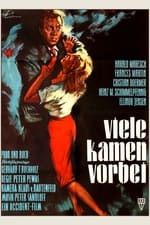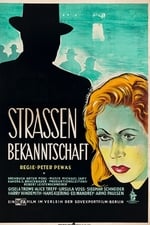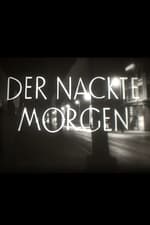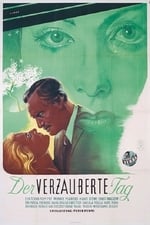Personal Info
Known For Directing
Known Credits 15
Gender -
Birthday April 22, 1904
Day of Death September 13, 1984 (80 years old)
Place of Birth Berlin, Germany
Also Known As
- -
Content Score
100
Yes! Looking good!
Login to report an issue
Biography
April 22, 1904, in Berlin, made an apprenticeship as a metal worker after finishing school and worked in his job in Czechoslovakia and in Austria. In 1920, he went to Weimar"s Bauhaus for nine months and studied under Paul Klee, Wassily Kandinsky, and Laszlo Moholy-Nagy. From 1933 on, Pewas worked as a freelance commercial artist and created film posters and movie theatre adverts.
In 1932, Pewas started a documentary film project about Alexanderplatz but was arrested by the Gestapo during filming in 1934 and his footage was confiscated. Suspected of high treason, Pewas was sent to jail twice. After his release, he continued to work as a commercial artist in the movie business.
Then, Pewas started to study directing at film academy and worked as an assistant director for Wolfgang Liebeneiner"s films "Bismarck" (1940) und "Ich klage an" ("Accuse, I", 1941). In 1942, he worked for Tobis and made the short films "Eine Stunde" und "Zweiklang". In 1943, Pewas finished his first feature-length film for Terra, the heavily stylized elegiac melodrama "Der verzauberte Tag" – a film that in its aesthetics was diametrically opposed against contemporary fashion. The film was accused of "cultural Bolshevism" and eventually banned for alleged "contempt" against Germany"s lower middle class and for several nude scenes in October 1944. After the end of the war, Peter Pewas served as district mayor of Berlin-Wilmersdorf for several months before he became one of the founders of DEFA in Babelsberg. In 1947, he finished the successful sex education film "Straßenbekanntschaft" ("Street Acquaintances") that today ranks among the most influential "rubble films", for DEFA.
April 22, 1904, in Berlin, made an apprenticeship as a metal worker after finishing school and worked in his job in Czechoslovakia and in Austria. In 1920, he went to Weimar"s Bauhaus for nine months and studied under Paul Klee, Wassily Kandinsky, and Laszlo Moholy-Nagy. From 1933 on, Pewas worked as a freelance commercial artist and created film posters and movie theatre adverts.
In 1932, Pewas started a documentary film project about Alexanderplatz but was arrested by the Gestapo during filming in 1934 and his footage was confiscated. Suspected of high treason, Pewas was sent to jail twice. After his release, he continued to work as a commercial artist in the movie business.
Then, Pewas started to study directing at film academy and worked as an assistant director for Wolfgang Liebeneiner"s films "Bismarck" (1940) und "Ich klage an" ("Accuse, I", 1941). In 1942, he worked for Tobis and made the short films "Eine Stunde" und "Zweiklang". In 1943, Pewas finished his first feature-length film for Terra, the heavily stylized elegiac melodrama "Der verzauberte Tag" – a film that in its aesthetics was diametrically opposed against contemporary fashion. The film was accused of "cultural Bolshevism" and eventually banned for alleged "contempt" against Germany"s lower middle class and for several nude scenes in October 1944. After the end of the war, Peter Pewas served as district mayor of Berlin-Wilmersdorf for several months before he became one of the founders of DEFA in Babelsberg. In 1947, he finished the successful sex education film "Straßenbekanntschaft" ("Street Acquaintances") that today ranks among the most influential "rubble films", for DEFA.
Directing
|
||||||
|
||||||
|
||||||
|
||||||
|
||||||
|
||||||
|
||||||
|
||||||
|
||||||
|
||||||
|
||||||
|
Writing
|
|||
|
|||
|
|||
|
|||
|
|||
|
|||
|
|||
|
Acting
|
|||
|




